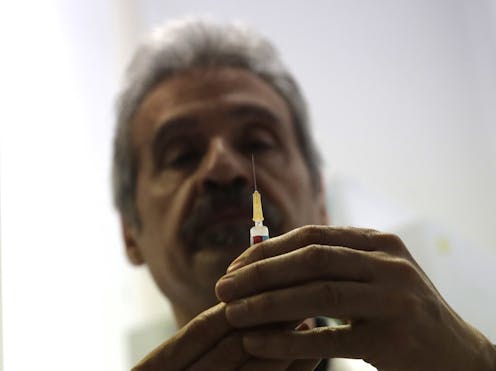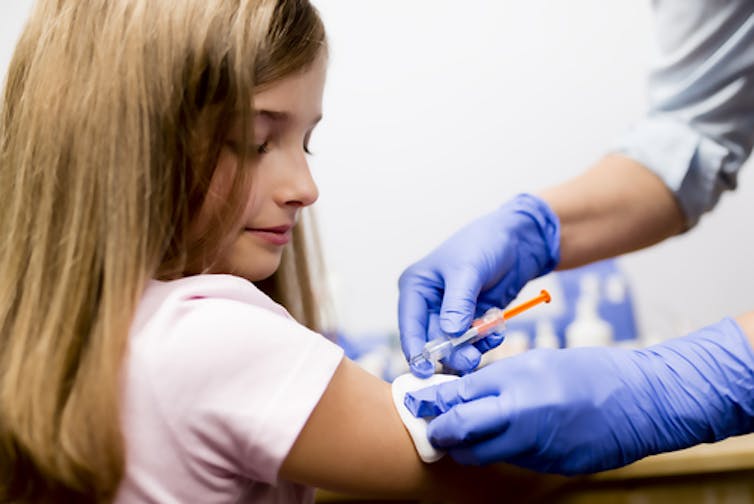Could a booster shot of truth help scientists fight the anti-vaccine crisis?
Anti-vaccination sentiment is leading to disastrous consequences, not only in the U.S. but European countries, particularly Italy. A philosopher of science suggests how best to use facts to fight it.

The recent outbreak of measles cases in Clark County, Washington – which has been linked to a plummeting vaccination rate in this hotbed of anti-vaccination activism – makes clear that conspiracy theories, fear, and misinformation know no partisan bounds. The Governor has declared a state of emergency and sent public health officials out to talk to parents – sometimes one on one – as more than 60 cases have now been reported.
Now imagine what might happen if the government itself had embraced an official anti-vaccine policy.
As a philosopher of science who has studied science denial, I know that science denial is a world-wide phenomenon. Although some anti-science claims like evolution denial are particularly virulent in the U.S. (outstripped only by Turkey), it’s not just America that faces this problem.
This can be both a blessing and a curse. While it’s sad to know that the forces behind science denial are larger than any one culture or political party, it’s good to know that if we study what is happening elsewhere, it may help us learn how to fight science denial in general.
One of the first lessons to be learned from this “metastasis” of science denial is how dangerous it is not to fight back. As we’ve seen with climate change in the U.S., science denial isn’t limited to fringe groups – if it isn’t fought in the trenches of corporate interest and ideology, it can spread not only to the general population, but to government too, with horrible policy consequences. But it matters too how we fight back, which I believe is illustrated perfectly by what is happening with the anti-vaccination movement.
The anti-vaccination crisis in Italy
First, it is important to state the facts: the hypothesis that vaccines cause autism was based on a fraud. Andrew Wakefield’s bogus 1998 study has been debunked numerous times and, in the end, it was learned that the whole thing arose not from sloppy science or a mistake, but from what some called deliberate manipulation of the data based on an undisclosed conflict of interest. Wakefield’s paper was retracted and his medical license was stripped. Yet still the generalized fear of vaccines has survived and taken hold among a world-wide audience of parents who are confused and suspicious – and love their children just as much as the rest of us.
At a recent scientific conference in Rome, I learned of a public health debacle that has been brewing in Italy for years.
In 2012, an Italian court ruled there was a link between autism and the measles mumps rubella vaccine; this was overturned in 2015. By that time, however, vaccination rates in Italy had fallen to 85 percent – well below the 95 percent rate that public health officials consider essential for “herd immunity.” As one prominent researcher, Roberto Burioni, put it “Italy’s measles vaccination coverage was on par with Namibia, lower than Ghana.”
Then, just as in Washington state today, measles cases started to rise. In 2016, there were 850 measles cases in Italy. By 2017, this had grown to 5,000. By that point, Italy accounted for 34 percent of all the measles cases in Europe, and 89 percent of the measles cases in Italy were made up of people who hadn’t been vaccinated. In response, health minister Beatrice Lorenzin introduced a compulsory law that parents had to vaccinate their children for daycare and school, with shots against ten diseases, including the MMR. Over time, the vaccination rate increased.
Then, in June 2018, the Five Star Movement came to power and formed a coalition government with the Hard-Right League, which found support in Deputy Prime Minister Matteo Salvini, who was anti-vaccination. Distrustful of experts and institutions, steeped in conspiracy theories, and emphasizing the importance of “personal freedom,” Salvini claimed that vaccines were “useless and in many cases dangerous.” During the campaign some in the Five Star Movement had maintained that compulsory – and state-funded – vaccines amounted to “free genocide.”
Then in August 2018, the new government sought to overturn the law to make vaccines compulsory, in favor of allowing parents to “self-certify.” As measles cases continued, there was some hedging and the government agreed to keep the law in place for another year. In December 2018, Giulia Grillo, the new health minister, announced that all 30 members of the Higher Health Council advisory panel would be fired. Soon after, the director of Italy’s National Institute of Health (ISS), Walter Ricciardi, resigned in protest over the Italian government’s “anti-scientific” vaccine stance.
Changing minds
What is the best way to fight back against such rank ignorance, when it appears at the highest levels of government?
Unfortunately, some of the defenders of science themselves have chosen to engage in what I would call “post-truth” tactics. In a 2014 television interview, then-health minister Beatrice Lorenzin made the claim that 270 kids in London had died of measles in 2013, due to anti-vaccination efforts. Except that this wasn’t true. Was this a mistake? A lie? In any case, it was dangerous, because when the truth came out it only further undermined public confidence in getting reliable information from the government.
What lesson might we learn from this? Some might condone lying in such an emergency. It must be tempting, in the face of willful ignorance and misinformation, to cut corners and pretend there is no such thing as scientific uncertainty. But this too is a lie, and undermines the very tool we need most to fight back against science denial, which is a better understanding of how science works and why its claims are reliable.

One should not pretend that vaccines are 100 percent safe. There have been isolated cases of negative reactions, sometimes even leading to death. These, however, represent such a small risk – as compared to the much larger one of dying from childhood diseases like measles or whooping cough – that unless a child is immuno-compromised, it doesn’t make sense to forego vaccines. Indeed, because there are immuno-suppressed children out there, one might say that it is the obligation of the rest of us whose children are not in such a risk group to make sure that our own children are vaccinated.
Although it might lead to a more difficult conversation, I believe that embracing uncertainty and doubt as a strength, rather than a weakness, of science is a better strategy for fighting science denial in the long run.
Any scientist who understands inductive reasoning knows that no empirical hypothesis can ever be 100 percent proven. And scientists can also make mistakes. But does this justify the assertion that all hypotheses are equally likely to be true? Or that all risks are equal? No. Lack of certainty does not mean that there is no such thing as likelihood or probability, for these are precisely the measures against which scientific conclusions are evaluated.
Scientific claims are based on evidence. Scientists’ beliefs are justified (warranted) because they fit with the facts. Although this may not reach the level of truth because no scientific belief can ever be proven or confirmed, it is significant that this is where scientists aim. So why squander this and begin to use post-truth tactics in the defense of science? When we lie about the certainty of science, it only raises the suspicions of a community that may be disinclined to trust scientists in the first place.
In my view, what we need most to fight science denial is a better understanding of how science works. Not just more knowledge of scientific conclusions, but of the process by which scientific theories are tested and justified in the first place. Rather than pretend that science (or scientists) are perfect – that there is no such thing as cognitive bias or that conflicts of interest never arise – why not embrace what is most special about science, which is that in science there are transparent community standards by which we may discover and correct any error?
As they go house to house, this is at least part of what public health officials in Washington might try to explain to anti-vaccine skeptics. When we take the time to explain the science behind vaccines – rather than belittle every doubt – might this not be the most effective strategy of all?
In this post-truth age, some have claimed that it is impossible to change anyone’s mind with evidence, that even empirical belief is based on our identity. If you belong to the tribe of vaccine-deniers it must be difficult to accept the idea that – by rejecting the consensus view of science – you may be risking your child’s life.
But might scientists also be tribal? If so, let it be around belief in the creed that binds them, which embraces both openness to new ideas and a resolve to test them. The scientific attitude consists of basing our beliefs on evidence, and being willing to change those beliefs as new evidence comes in. Instead of “lying in service of the truth,” let this be what guides us.
Lee McIntyre recently attended a conference that was sponsored by the Ministry of Health of Italy.
Read These Next
Trump trial reveals details about how the former president thinks about, and exploits, the media
Both scholars stressed they are working very hard to be ‘vigorously neutral’ about Trump himself,…
Trump’s immunity arguments at Supreme Court highlight dangers − while prosecutors stress larger dang
The case argued before the Supreme Court has profound implications for Donald Trump − but also for…
How bird flu virus fragments get into milk sold in stores, and what the spread of H5N1 in cows means
Five livestock experts who study infectious diseases in the dairy industry explain the risks.



